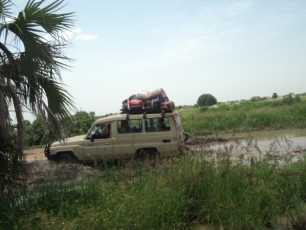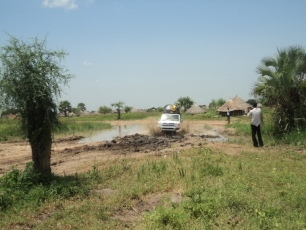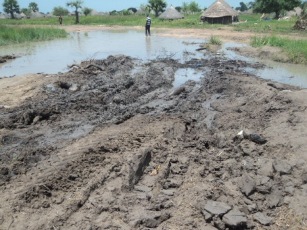Poor roads force Juba—Bor drivers to pay ‘by-pass’ taxes
August 5, 2011 (BOR) – Travellers on the damaged Juba—Bor road are being asked to pay extra fees to be allowed to use paths through homes along the highway as the main road has become risky to drive on.

As transport fares continue to rise in South Sudan, owners of public transport are now being asked by people who live next to the Juba-Bor road to pay a fee to use their area so that they can avoid travelling on damaged or flooded parts of the road.
Passenger buses have stopped travelling from Bor to Juba due the conditions on the road but four wheel drive vehicles still transport people. Fares have increased from 50 South Sudan Pounds to 100 SSP. This increases to 120 SSP during the rainy season.
Drivers travelling to Bor on Thursday told Sudan Tribune that the doubling of prices was due to taxes, bad roads and increases in fuel prices. The new charges for using short-cuts through villages and homesteads is also adding to the cost.
“You pay 20 South Sudan pounds at Magula, 10 SSP at Gemeza (Central Equatoria state), 20 SSP at Pariak and 10 SSP at Pakua (Jonglei state) as taxes,” a shocked driver said when asked why fares are increasing.

At Panwel and Goi in Bor county, Jonglei state, where the road is completely submerged by water, four-wheel cars are the only vehicles that can pass but even they have to go off the road and must pay to be allowed through.
“If you don’t pay, you will not pass,” a woman in Panwel County shouted at a car a Sudan Tribune reporter was travelling in. She claimed that passing next to her hut damages it as the cars can create holes that can fill with water and effect the walls.
She blocked the by-pass with wooden logs with help of other women who together told the driver to pay a fee or return to Juba.

fee applies to traffic going both ways.
Construction of Juba—Bor road started in 2007 but came to a halt a few kilometres into Jonglei state territory.
The caretaker minister of transport and road in the Republic of South Sudan, Lino Makana said recently that construction was delayed due to lack of funds despite the project being included in 2011 national budget. It is unclear why the funds are lacking.
The ministry of roads and bridges in the Government of South Sudan on Wednesday said all road construction campaign promises made by President Salva Kiir, during last year’s general elections, will be implemented by 2015.
“We know all the president’s promises but they cannot all be implemented this year, we will implement them in phases till 2015,” said Director General of roads and bridges, Abraham Mabor, explaining the 2011 budget allocated to the ministry does not cover internal roads in each of the ten states.
“Much of the budget for 2011 will be spent on roads and construction of bridges connecting main places and town[s]. The ministry is also prioritising feeder roads connecting agriculture schemes and projects”, he added.
(ST)
